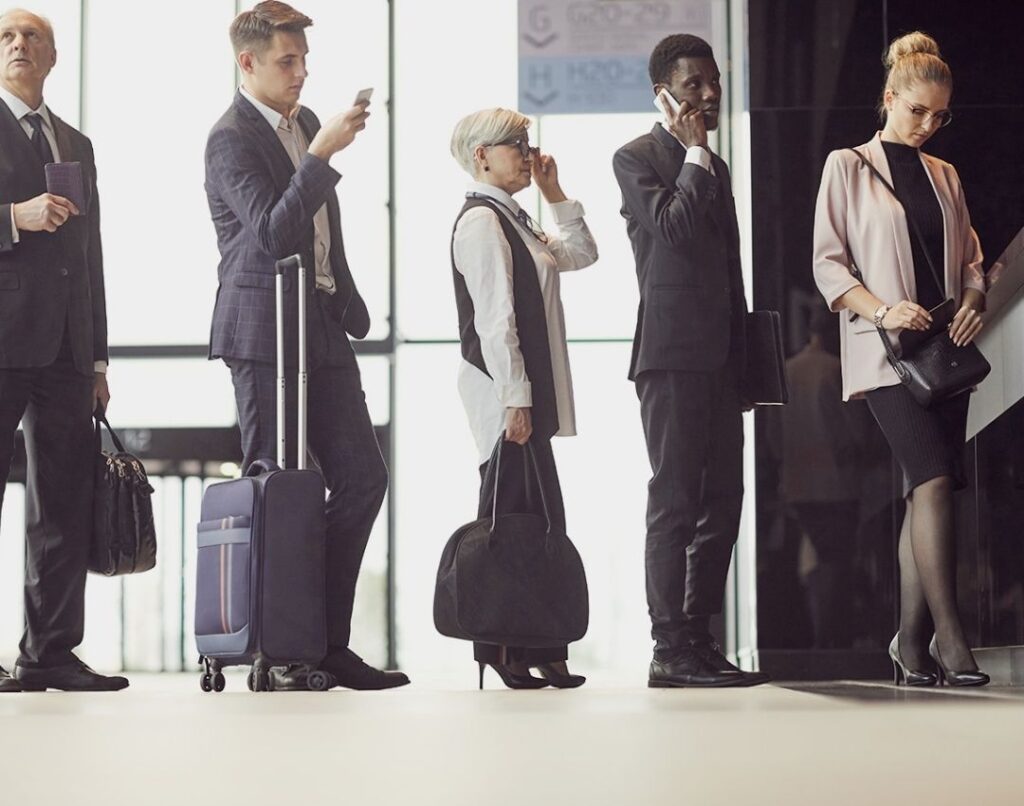What you’ll learn in this article:
- How to save on business travel costs
- How you can safeguard business travellers’ wellbeing
- How to reduce corporate travel’s carbon footprint
Operating in a fast-paced corporate landscape means managing a number of business travel challenges. A combination of rapidly shifting global regulations, fragmented booking behaviours and rising traveller expectations feature high on the list of challenges facing those organising corporate travel programmes. So how can these challenges be managed?
1. Managing business travel costs
According to a survey in Business Travel News Europe, increasing costs is one of the major business travel challenges for buyers this year. And that’s before inflationary pressure and uncertainty in the global economy is factored in.
Working with a travel management company (TMC) can help you manage those cost pressures on your travel budget. Their strong partnerships with airlines lead to a greater choice of richer content and competitive pricing options directly from those airlines’ NDC.
A TMC can secure preferred rates and unique offerings at business travel destinations. Plus offer many other ways to add value to your overall budget in the long-term. One of those is combining business travel with events spend, providing total spend visibility in one report.
2. Travel policy compliance
Tracking travel spending can be tricky if your business travellers are booking outside of travel policy. Having a clear travel policy in place helps companies manage expenses, track cost savings and whether travellers are making sustainable travel choices, as well as ensure traveller safety. Clarity on travel policy also boosts employee satisfaction, which is crucial for talent retention and recruitment. How can this be achieved? Through keeping the policy concise, considering all employees’ needs and regularly communicating the policy. These top tips offer further guidance.
3. Managing multiple invoices
Managing a corporate travel programme means juggling a stream of invoices from airlines, hotels and car hire companies. A TMC provides consolidated or centralised invoice management, using advance booking and expense tools that automatically match receipts with bookings, reducing manual data entry error and time spent on managing invoices.
Furthermore, it’s possible to customise invoice formats, including project codes and cost centres, tailored towards your company, across any sector, whether that’s for law firms or for businesses in the Energy & Marine sector.

4. Ensuring traveller safety
Employers have a responsibility to ensure the safety and wellbeing of their employees, especially when they are travelling for work. In case of emergencies, whether that’s natural disasters, geopolitical tension or medical issues, being able to track your business travellers means being able to provide necessary support speedily.
A TMC can help by offering offer traveller tracking where clients can view the exact location of their travellers on an interactive risk map and allow messages to be shared with travellers located in specific regions.
5. Looking after traveller wellbeing
Maintaining a work/life balance ranks highly for employees, according to a report by global recruitment firm Randstad. And employees can be faced with a raft of challenges when taking business trips, from transport delays and cancellations to jet lag and disruption to wellbeing practices.
Prioritising traveller wellbeing is crucial for a number of reasons, such as employee health and productivity and enhanced job satisfaction for retention and recruitment. In addition, healthier employees equal fewer sick days and overall is good for company reputation. Explore more ways on how you can help safeguard business travellers’ wellbeing.
6. Reducing carbon footprint
From ethical and environmental concerns to the need for economic and regulatory compliance, companies are looking at how they can effectively reduce their carbon footprint. All while simultaneously managing costs and balancing the need to provide the best travel experience for employees – it’s one of the key business travel challenges right now.
Having a deep view of CO2 performance data can help manage this. Reed & Mackay’s partnership with Squake allows travellers to make more sustainable choices through enhanced data, while our collaboration with Clarasight provides clients with the option to improve efficiency, as well as drive cost savings and emissions reductions across their travel programmes.
And, if encouraging employees to choose the more sustainable travel options can be a challenge, try out these suggestions for greater engagement.

7. Dealing with travel disruptions
One of the major business travel challenges companies face is that disruptions happen to travel plans at any time, day or night, whether they’re caused by severe weather events, operational issues or strike action. Yet your travellers still need to get to and from their destinations as seamlessly as possible, to minimise impact on both their work and personal lives.
So contingency plans are essential. With a proactive 24-hour Incident Management Unit in place, our clients receive any information on industrial action, airport passenger caps, bad weather or general disruptions like protests as soon as they happen – and often before. Our consultants then work with clients to get their travellers moving again.
8. Safeguarding business travellers’ cyber security
Safeguarding clients’ personal data and information should be a top priority for every business. With steady optimism on the growth of business travel this year, more employees will be working outside the security of their office networks. This increases the potential for them to become targets of cyber attacks. Business travellers need to be aware of the risks and potential consequences for their company if a cyber security breach occurs. These top tips can get you started.
9. Finding the right booking platform for your business
Managing a corporate travel programme requires booking platforms that deliver a seamless booking experience. One that saves time, reduces errors, increases productivity, optimises cost and provides data to make decisions on sustainable travel. In essence, a platform that improves the user experience is as important as the platform’s core functionality.
Reed & Mackay recently made a series of enhancements to its proprietary technology, including a redesigned user interface and improved air booking process, alongside offering the most comprehensive content.
10. Meeting travel service needs
As any travel buyer and traveller knows, changes in managed business travel can be both frequent and complex. This is why having access to a dedicated service from a team of committed, in-house business travel consultants remains essential. And the long-term benefits to both the travel buyer and the traveller are manifold.
Our experts take the time to get to know both buyers and travellers as individuals, adopting a detail-oriented approach to handle even the smallest aspects on their behalf. With consultants averaging 15 years’ experience in the industry, knowledge sharing and support between consultants delivers a premium service.
11. Incorporating bleisure travel into policies
Global spending on bleisure travel is expected to surge to US$360 billion by 2027, up from US$150 billion in 2021, reflecting a shift in how people approach work travel. This, in turn, will result in a growing need to understand how you can incorporate bleisure into your corporate travel programme, to ensure it makes sense for both the organisation and its travelling employees. Discover more with these key pointers to consider.
Get in touch
Mail [email protected] to discuss all of your corporate travel and event management needs.




